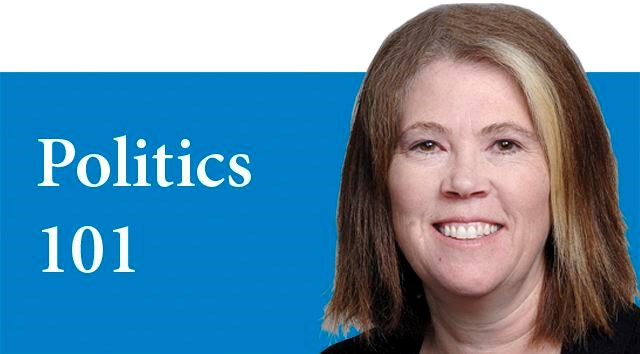So last week I promised to take a look at Donald Trump's speech to the UN but before I dive into the specifics, I have to say that this column has really come full circle and that there have been many linking threads and ideas in my mind over the last few weeks that are all interconnected. I hope I can weave the pattern clearly.
I need to begin by telling you that my students and I are currently exploring contemporary political issues. A course such as this can take on a life of its own as the readings from every day newsfeeds builds a web of interesting questions about the world we live in. Sometimes, in order to ground our thinking and create a way for us to contextualize the many ideas, facts and stories from around the world, professors will draw on theories from scholarship that have framed discussions over a number of years. These theories are usually important in our disciplines of study and are often scrutinized and criticized even though they are considered as important contributions to thinking.
One such big idea emerged in the late 1980s. An American Policy Planning staff member at the U.S. Department of State and a Ph.D from Harvard, Francis Fukuyama burst onto the scene with a short essay entitled, The End of History? He would later write a book that would examine the basic themes of the essay but the essay itself had a transformative impact on the study of politics.
Fukuyama's thesis was that, in the history of ideas about how we should live together, liberal democracy had won. He argued that the basic principles of democracy, equality and liberty, are at the heart of every human's need to be a fully realized person. He pointed to a number of moments in history, including the end of the Cold War, that demonstrated that neither communism nor fascism could fulfill these principles and so liberal democracy was the only system left that could deliver on these principles. In the final part of the essay, Fukuyama questions whether there are other ideas beyond communism and fascism that could challenge liberal democracy and among the challengers he mentions nationalism. Now his argument about nationalism is a bit complex but he essentially conveys the idea that nationalism itself is not a coherent enough system upon which to create long lasting principles to live by and that liberal democratic societies are "incomplete" until they work out how nationalism is dealt with to fulfill the promise of liberty and equality.
I tell you all of this to get to Donald Trump's speech. Like many American presidents, Trump pointed out the end of history thesis when he said: "The problem in Venezuela is not that socialism has been poorly implemented, but that socialism has been faithfully implemented. From the Soviet Union to Cuba to Venezuela, wherever true socialism or communism has been adopted, it has delivered anguish and devastation and failure. Those who preach the tenets of these discredited ideologies only contribute to the continued suffering of the people who live under these cruel systems. America stands with every person living under a brutal regime."
The president's speech reasserted the American First principle from his campaign promises: "In foreign affairs, we are renewing this founding principle of sovereignty. Our government's first duty is to its people, to our citizens, to serve their needs, to ensure their safety, to preserve their rights, and to defend their values. As president of the United States, I will always put America first...." But modern, global problems are more complex than ever before: preserving the values of liberal democracy might require a much more cooperative approach and a recognition that the success of the planet goes beyond borders.
Moreover, the kind of nationalism that the president espouses in domestic policy is not built on pluralism and diversity as its first measure of citizenship.
This observation leads me back to my column last week and my visit to Rideau Hall and to Justin Trudeau's UN speech where diversity, pluralism and reconciliation were front and centre. Canada still has a very long way to go but I found it interesting to open the Globe and Mail to see the Governor General's farewell column entitled, "Pluralism is a path to lasting peace and prosperity." The conversation certainly lives on and how we develop our liberal democracies to make human fulfillment a possibility is more important than just declaring a winner.
A note: I should mention that Fukuyama's thesis has been challenged in many ways but it remains a critical launching point about the nature of ideology in the 21st century.



